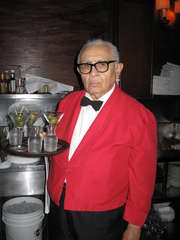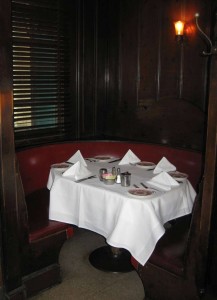@jamesscottbell
There was a bit of a dustup recently over the issue of who should be “allowed” to be called an “author.” The incendiary post can be found here. A response, here.

@jamesscottbell
There was a bit of a dustup recently over the issue of who should be “allowed” to be called an “author.” The incendiary post can be found here. A response, here.
[I’m jumping in early for Mr. Miller, who will take my regular slot tomorrow]
Fellow thriller writer Brett Battles wrote a post this week at Murderati, on the use of actual locations in fiction. I am all for it. Since I grew up, and still live in, the greatest noir city on earth, I’d like to offer you from time to time a bit of my city. Take you to some of my favorite spots and tell you what they mean to me as a writer.
I’ll start with with Musso & Frank Grill in Hollywood.
As classic writers’ hangouts go, you can’t do much better than Musso’s. Walk inside and history overtakes you.
It’s the oldest eatery in Hollywood. Since 1919 the big green sign says. In fact, most of the waiters look like they were original hires. That’s part of the appeal: red coated, old school waiters with accents and attitude. Don’t expect perky twenty-somethings with fake smiles and flair.
 And please don’t call the place “Musso & Frank’s” with the apostrophe S. While the S was sometimes on the end of Frank in early menus, it was decidedly dropped. Angelenos call it “Musso’s” for short.
And please don’t call the place “Musso & Frank’s” with the apostrophe S. While the S was sometimes on the end of Frank in early menus, it was decidedly dropped. Angelenos call it “Musso’s” for short.
Probably every L.A. writer who ever lived has had a martini at Musso’s, or at least seen them poured. Many a writer has had too many. Jim Thompson, the perennially struggling scribe of hardboiled novels in the 50’s, often had to be helped home after a night at the bar. Likewise the notorious drunk Charles Bukowski, who references Musso’s, and his drinking therein, in his novel Hollywood.
 Of course, actors love the place too, and have since Valentino and Chaplin used to nosh there, most of the time at Booth #1 by the front window. Come at night and you’ll walk by somebody in the movie biz, even if you don’t know who they are. There’s always a lot of “Let’s take a meeting” talk over drinks and dinner.
Of course, actors love the place too, and have since Valentino and Chaplin used to nosh there, most of the time at Booth #1 by the front window. Come at night and you’ll walk by somebody in the movie biz, even if you don’t know who they are. There’s always a lot of “Let’s take a meeting” talk over drinks and dinner.
You can find the history and some of the stories here.
I like to drop by Musso’s when I’m in Hollywood, mainly to get my favorite dish (see below). In fact, I mention Musso’s in all three of my Buchanan books. In Try Darkness, Ty Buchanan, lawyer, is staking out Musso’s with an unlikely helper, the nun Sister Mary Veritas.
I had Sister Mary park at the curb. “Looks like a little early dinner at Musso’s,” I said. “Ever been there?”
“No.”
“Want to go in? Have a martini?”
“Mr. Buchanan—”
“Ty, please.”
“—don’t mess with me.”
“Not messing. They’re famous for their martis. One of those and you’ll be so theological you’ll—”
“Thank you, no.”
“A milkshake?”
“Some other time.”
And in Try Fear, Buchanan has my favorite dish:
I checked my watch. Almost eleven-thirty. I was in Hollywood, so I drove down the boulevard to Musso & Frank. I found a meter in front, fed it, went in, and sat at the counter. And ordered liver and onions.
That’s what I said.
My mom used to make liver and onions, and I always liked it. With ketchup. The old waiter—there is no other kind at Musso’s—gave me a plate of sourdough bread and a dish with butter pats. He asked if I needed anything else.
“Ketchup,” I said. “For the liver.”
He leaned over, and with a slight Hungarian accent said, “Don’t tell the chef.” Then added, conspiratorially, “I like it that way, too.”
If you’re ever out this way, doing the L.A. visit thing, and you get tired of the tourist spots and the faux stars posing in front of the Kodak Theater—and if you want a taste of authentic old Hollywood—come to Musso’s. It looks pretty much the way Cary Grant and Sterling Hayden and Raymond Chandler saw it. Step inside, go back in time, enjoy. Just be aware that the prices are not the same as they were in 1950. But the portions are generous.
So what about you? Do you have a favorite hangout in your hometown?
And if you’re coming to the Left Coast Crime convention next month, be sure to check out my walking tour of classic noir L.A., “From Angels Flight to Darkest Night” on March 12 starting at 11 a.m.